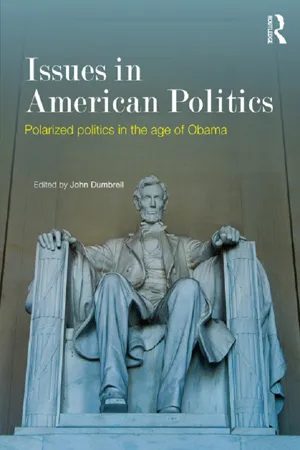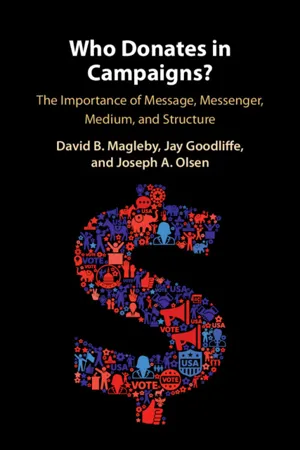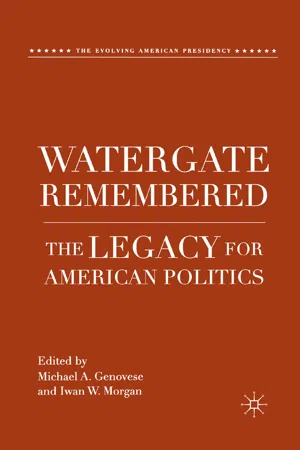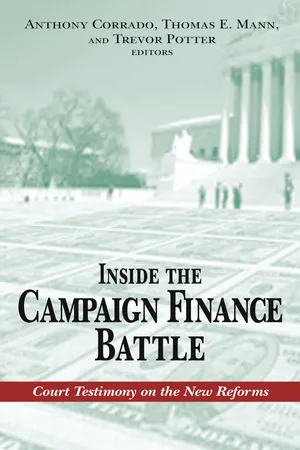Politics & International Relations
Federal Election Commission
The Federal Election Commission (FEC) is an independent regulatory agency in the United States responsible for enforcing campaign finance laws. It oversees the financing of federal elections, including the disclosure of campaign contributions and expenditures. The FEC also administers the public funding of presidential elections and investigates and prosecutes violations of campaign finance laws.
Written by Perlego with AI-assistance
Related key terms
1 of 5
6 Key excerpts on "Federal Election Commission"
- eBook - ePub
Issues in American Politics
Polarized politics in the age of Obama
- John Dumbrell(Author)
- 2013(Publication Date)
- Routledge(Publisher)
US subsidization is meagre compared to that of other democracies. Its cash forms are confined to presidential elections. As mentioned above, public cash subsidies are available to partially fund presidential nomination campaigns and to completely fund the general election in exchange for limiting spending in total and, in the general election, forgoing private contributions. Parties also receive public funds to help finance their national conventions ($16.3 million in 2008). In-kind subsidies include a requirement of broadcasters to price election campaign advertising at their lowest rate, and the US Postal Service charges its lowest rates to deliver election literature. In contrast to the situation in most western democracies, there are no public subsidies to help run political parties or their election campaigns. Nor are there any public funds to help fund candidates running for the House or Senate. In no elections are candidates eligible for the in-kind benefit of free election broadcasts.Effects of regulation
The inception of the Federal Election Commission, and the use of its enforcement powers, has helped to ensure that campaign finance law is adhered to. Violations do occur, but there is no suggestion that they are widespread, so the FECA system strongly shapes how money is raised and spent. This formative effect registers both in the widespread adherence to the law and also in the ingenuity shown in circumventing its intent without breaching its letter. But the law does matter, because it shapes where and in what forms money finds a way into campaigns. This has generated some unique or uncommon features of American election money compared to that of other western democracies. Amongst these untypical effects are the candidates’ financial independence from parties, the small size of donations, the constancy of fund-raising activity by individual candidates, the number of self-financed candidates, the diversity of forms of interest group money and the vast sums spent independently of the candidates.The trend towards candidate-centred campaigns did not originate from the 1970s campaign finance reforms, but they did give them impetus. Under FECA, parties are restricted in how much they can give their candidates. To improve their election prospects candidates look beyond their parties for additional funds. Many candidates were raising most of their money from non-party sources before FECA, but its inception accelerated and necessitated their independence of party money. FECA capped how much parties could give their candidates for Congress and barred any party contribution to publicly funded candidates in presidential elections. The caps on party giving to congressional candidates were less than half the cost of the average winning campaign when they were introduced. The absence of adjustments for inflation, which campaign spending outpaced, progressively eroded the value of party donations to candidates. In 2008, parties could give House candidates a maximum of $30,000, when the average winning candidate spent $1.7 million. Senate candidates could obtain $40,000 from their parties, when winners spent an average of $7.5 million that year. - eBook - PDF
Governance and Politics in Post-Military Nigeria
Changes and Challenges
- S. Adejumobi(Author)
- 2010(Publication Date)
- Palgrave Macmillan(Publisher)
The former con- ducts elections at the federal and state levels, while the latter handles the local elections. The logic is that local governments are under the purview of the states, and as such, state electoral authorities should handle elections at the local government levels. However, the rela- tionship between the two tiers of electoral management bodies is not clearly defined, which leads to tension, contradictions, and sometimes conflicts. INEC derives its existence from the 1999 Nigerian constitution; it is listed in section 153 of the constitution as one of the federal execu- tive bodies. Its constitutional responsibilities include: • Organize, undertake, and supervise all elections to the offices of the president, the vice president, the state governors and deputy governors, the Senate, the House of Representatives, and the House of Assembly of each state of the federation. 96 SAID ADEJUMOBI • Register political parties in accordance with the provisions of the constitution, and monitor their organization and opera- tions, including finances. • Arrange for the annual examination and auditing of the funds and accounts of political parties, and publish a report on such examination and audit for public information. • Arrange and conduct the registration of voters and maintain and revise the voters’ register for the purpose of any elections. • Delimit and delineate constituencies. Under the 2006 Electoral Act, INEC was given two additional responsibilities: to undertake voter education and to regulate parties’ and candidates’ campaign funding and expenses. The commission is made up of a chairman, who is the chief elec- toral officer; 12 commissioners; and a secretary. The chairman and members of the commission are to be persons of unquestionable integrity and no less than 50 years of age in the case of the chairman and 40 years for the other members. - eBook - PDF
Who Donates in Campaigns?
The Importance of Message, Messenger, Medium, and Structure
- David B. Magleby, Jay Goodliffe, Joseph A. Olsen(Authors)
- 2018(Publication Date)
- Cambridge University Press(Publisher)
5 This led to discoveries not only about how the Committee to Reelect the President (i.e. Richard Nixon) spent money on spying and “dirty tricks,” but also on where the money came from. These and other discoveries led to public pressure to reform how campaigns were financed and those reforms become the amendments to the Federal Election Campaign Act (FECA) enacted in 1974. 6 The 1974 FECA amendments and subsequent court cases on their constitu- tionality struck a balance between limiting corruption − or the appearance of corruption − and freedom of expression and association. The US democracy values freedom of expression, and the ability to contribute money to candidates or political parties is regarded as one means of exercising First Amendment rights. 7 Limits on Contributions and Electioneering The US Supreme Court for decades upheld limits to what individuals could contribute to candidates as constitutional, accepting the view that it is legiti- mate to limit the influence of any particular individual relative to other donors. A ban on corporate donations to candidates has been in existence since the passage of the Tillman Act in 1907, and union general treasury donations to candidates were banned by the Taft-Hartley Act of 1947. 8 Neither of these groups could spend from their general funds; instead, political expenditures came from their PACs, which had limits on contributions and expenditures. But the Supreme Court, lower courts, and the Federal Election Commission (FEC) have since enlarged the role corporations and unions can play in their independent electioneering efforts. The Supreme Court initially gave Congress some latitude in legislation designed to limit corruption; when the Court upheld the Bipartisan Campaign Limits on Contributions and Electioneering 295 Reform Act (BCRA) in McConnell v. - eBook - PDF
Watergate Remembered
The Legacy for American Politics
- M. Genovese, Iwan W. Morgan, M. Genovese, Iwan W. Morgan(Authors)
- 2012(Publication Date)
- Palgrave Macmillan(Publisher)
They included provi- sions that addressed the following areas: (1) limits on direct contributions: from individuals, PACs, and party committees; (2) spending limits for political parties expenditures on behalf of federal candidates: so-called coordinated expenditures; (3) candidate spending limits: for House, Senate, and presidential can- didates, which replaced the media expenditure ceilings in the 1971 FECA; (4) limits on independent expenditures: for expenditures by individuals or interest groups made independently of a candidate's campaign to advocate the election or defeat of a federal candidate; (5) the Federal Election Commission: the FEC was created to implement and enforce the federal campaign finance laws; (6) new disclosure and reporting rules: requiring quarterly contributions and spending reports from candidates, with such reports made pub- licly available; and (7) amending the presidential election public funding system: to allow major party presidential nominees to receive public funds up to a pre- set spending limit provided they do not accept any additional private money and to establish a voluntary system of public matching funds in presidential primary campaigns. 8 These provisions supplemented or enhanced the existing campaign finance system, which had already included public funding of presidential elec- tions, bans on contributions by corporations and labor unions, disclosure 130 Victoria A. Farrar-Myers requirements during primary and general elections, limits on media adver- tising, and limits on self-financing. One notable provision that was omitted from the 1974 FECA amend- ments was public financing for congressional elections. Early versions of the legislation that would ultimately result in the FECA amendments included public financing provisions. - eBook - PDF
Inside the Campaign Finance Battle
Court Testimony on the New Reforms
- Anthony Corrado, Thomas E. Mann, Trevor Potter, Anthony Corrado, Thomas E. Mann, Trevor Potter(Authors)
- 2004(Publication Date)
- Brookings Institution Press(Publisher)
Introduction Congress last year enacted the Bipartisan Campaign Reform Act of 2002, the first major revision of federal campaign finance law in a generation. The sponsors and supporters of this legislation describe the statute as a long overdue and urgently needed package of reforms designed to restore the system of campaign finance envisioned by Congress when it adopted the Federal Election Campaign Act (FECA) in the 1970s. Its purpose, they argue, is to repair egregious tears in the regulatory fabric that ren-dered utterly ineffective long-standing prohibitions on corporate and union treasury financing of federal elections and disclosure requirements for federal electioneering. The new law thus represents a necessary response to the changes that have taken place since the FECA was estab-lished and seeks to preserve the integrity of the political process by safe-guarding it from the corruptive influence of unregulated political contributions. Opponents portray the law as much more ambitious and ominous. In their view, the reform act represents nothing less than a wholesale assault on protected First Amendment speech and rights of political association. They claim that the law’s major restrictions would prohibit or discourage many individuals and organized groups from participating in federal elec-tions, which would reduce the amount of information available to the electorate and serve to further protect incumbents, who are already greatly advantaged in the electoral process. Opponents also claim that the law vio-lates fundamental principles of federalism, since it regulates state party committees, as well as some activities between national, state, and local 1 party committees and thus interferes in the operations and associational efforts of party organizations. In short, they argue, the reform act uncon-stitutionally limits political speech and participation and thereby under-mines the vitality of the political process. - eBook - PDF
- David B. Magleby, Anthony Corrado, Kelly D. Patterson, David B. Magleby, Anthony Corrado, Kelly D. Patterson(Authors)
- 2007(Publication Date)
- Brookings Institution Press(Publisher)
FEC, stating that “contributions limits are grounded in the important governmental interests in preventing ‘both the actual corruption threatened by large financial contributions and the eroding of public confidence in the elec-toral process through the appearance of corruption’” (for further discus-sion, see chapter 2). 34 Yet another legacy of the FECA and Buckley v . Valeo is the ability of individuals and groups to make unlimited expenditures for and against political candidates as long as those expenditures are genuinely inde-pendent of the candidate and party. Party committees were granted this 8 david b. magleby same right in a 1996 Supreme Court decision in Colorado Republican Federal Campaign Committee v . FEC . 35 As we document in this book, independent expenditures by individuals, groups, and party committees grew in 2004, and the activity by the political parties was especially important (see chapter 7). The new law left the Federal Election Commission (FEC) intact, a development that produced serious consequences in the midst of the 2004 presidential election season. Because of its bipartisan structure, the FEC became deadlocked on the rules defining whether 527s should be treated as federal political committees under the law and thus be subject to federal contribution limits and source prohibitions. The FEC basi-cally allowed the 527 groups to continue unimpeded by the new law. BCRA advocates vehemently contended that the lack of rulemaking by the FEC on electioneering activity circumvented the intent of the law and challenged the result in court. 36 Subsequent legislation on this mat-ter is again before Congress. BCRA also left the system of partial public financing of presidential elections unchanged despite widespread concern about the state-by-state spending limits in the prenomination phase and about the viability and adequacy of public funding in the general election phase.
Index pages curate the most relevant extracts from our library of academic textbooks. They’ve been created using an in-house natural language model (NLM), each adding context and meaning to key research topics.





